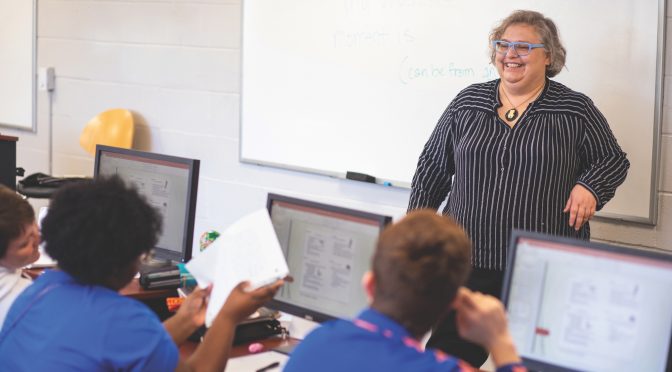Since its creation in 2015, 21 students have graduated from the UMKC Propel program, a transition program for young adults with intellectual and developmental disabilities. The job placement rate for those graduates? 100 percent.
“This is huge,” says Alexis Petri, Ed.D., principal investigator and project director, because the rate of employment for people with disabilities is approximately 30%. Petri, who is also an associate research professor in the UMKC College of Arts and Sciences’ Department of Psychology, also emphasizes how employment can profoundly change the lives of those with disabilities.
“Work plays a big role in most adults’ lives, yet many people with disabilities are either unemployed or underemployed,” Petri says. “This is truly a shame, for not only does this situation make their lives smaller and poorer, it means that people with disabilities don’t get to be full members of society or contribute to their families and communities as much as they could and want.”
People who attend college, including those with intellectual disabilities, are more likely to have a job and earn more at that job. People with intellectual disabilities who attend college are also more likely to live alone, be financially independent, be able to use public transportation, which, in turn, gives them more opportunity to participate in a variety of activities.
“College also gives people with intellectual disabilities a network of lifelong friends,” Petri adds.
Through her research, Petri bridges theory and practice to create change and allow access to higher education for people of a variety of abilities. She has experience working with National Science Foundation grants and others that look at learning supports for post-traditional students, such as military veterans who are now learning differently and want to major in college STEM programs.
And as an educational leader passionate about social justice, inclusion, access and public policy, Petri is ideal for leading the UMKC Propel program in accordance with the UMKC mission “to promote learning through the discovery, preservation and dissemination of knowledge of public value across a broad spectrum of disciplines and fields of study.”
The day-to-day business of improving lives
The UMKC Propel program began Oct. 1, 2015, with a U.S. Department of Education grant from the Transition Program for Students with Intellectual Disabilities and operates under the UMKC Department of Psychology. As principal investigator of the grant, Petri’s main responsibilities are in collecting data, managing relationships and sharing the Propel story.
The first nine Propel students graduated in May 2018. In May 2019, the Propel program celebrated its second cohort with 12 graduates. In 2020, 17 Propel students will graduate.
In August 2019, Propel welcomed its largest incoming cohort with 33 new students. Propel students are enrolled full time at UMKC. More than half the time, they’re attending class with students without intellectual development disabilities. Individualized coursework based on personal goals helps students focus on academic learning, work-based learning, career exploration, social learning and independent living skills. Propel students pay full tuition and many are eligible for Pell Grants. Students have on-campus jobs to help with the cost.
“Instead of struggling with what they can’t do, Propel students learn what they can do. Students learn about their abilities, and connect their abilities with their goals, hopes, and dreams,” Petri says. “Like college, Propel is not easy. We want students to face life and career barriers while in our program so we can help them.”
A unique program with unique outcomes
Petri says the ultimate success of the program is measured by how many graduates are in the workforce. Considering their 100% job placement rate, it’s safe to say the Propel program is thriving. Propel alums are currently working in restaurants, nonprofits, education, shipping, custodial services, nursing homes, assisted living facilities and as teachers’ aides.
While in the program, students get specific training to prepare for the workplace. Each semester, they earn work-based learning hours, which gives them resume experience. During the summer months, Propel students stay busy working and volunteering in the community. On May 28, 31 Propel students were sworn in as summer associates in the Volunteers in Service to America program, part of the Corporation for National and Community Service.
The average GPA across Propel is 2.96. Upon completion of the program, students receive an undergraduate certificate — in Leadership, Employment, and Community Engagement, which is recognized by the Missouri Department of Higher Education. Many courses transfer to other institutions if students choose to continue their studies.
“Propel also helps the UMKC campus understand this group of people,” Petri says. “It’s helping our campus be out ahead of the curve, which gives us an opportunity for knowledge translation. Diversity and inclusion during the post-secondary education experience for students with disabilities can provide a well-rounded academic experience for all students.”
The UMKC Propel grant ends Sept. 30, 2020, but Petri hopes it can continue because the community is beginning to learn more about the initiative. While there are similar programs around the country, Petri says Propel is unique because it is focused on academics and employment. She says other programs are primarily designed to offer students with disbilities an academic experience.
Moreover, Petri says her goal is to educate people, through Propel, about UMKC and all its resources.
“I have this hope that Propel gets people to think of UMKC,” she says.

